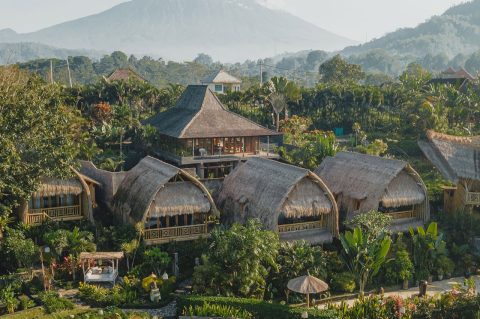4 Ways to Immerse Yourself in Balinese Culture
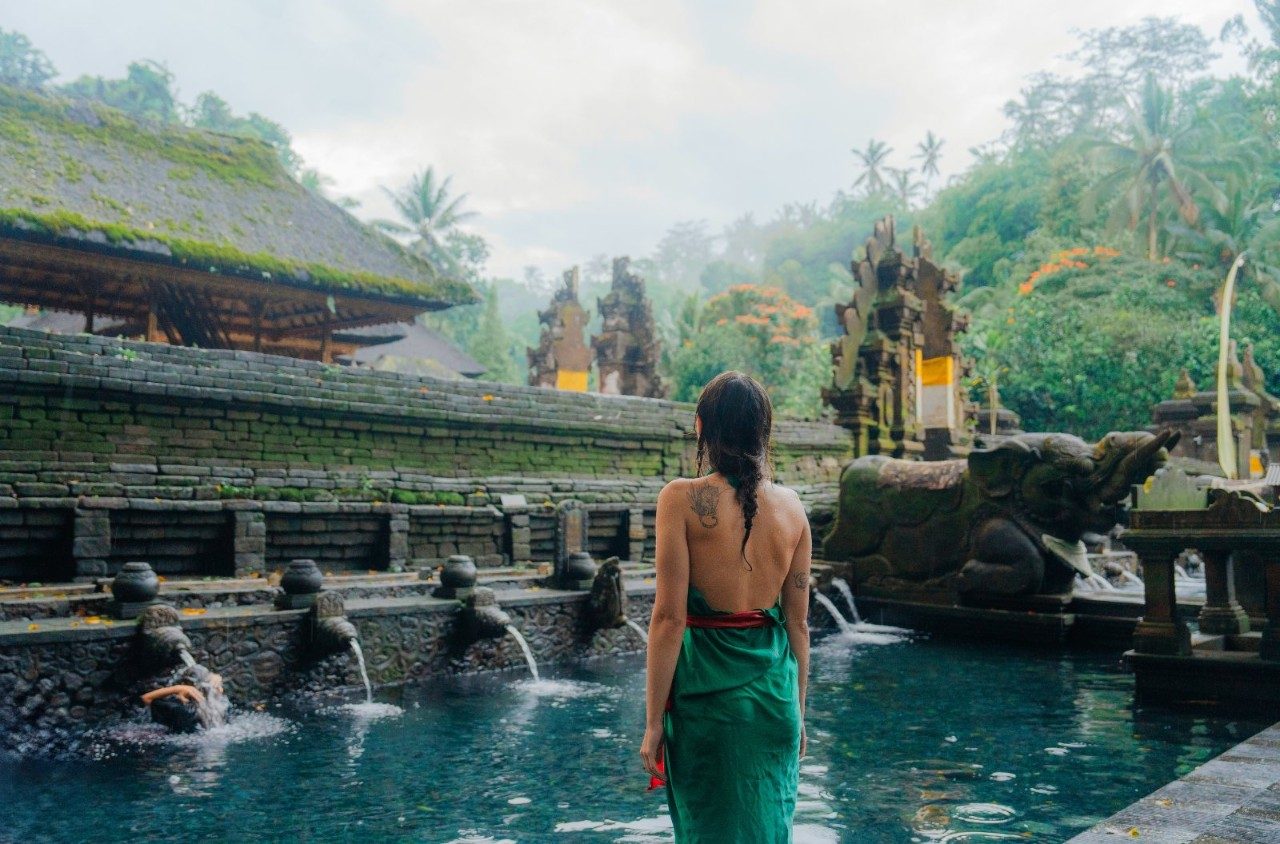
Bali’s allure has always been more than merely tropical island escapism. Just over a six-hour flight from Sydney, the Indonesian island may be best known for its lush mangrove forests and idyllic beaches but standing alongside its natural splendour is an ancient tapestry that weaves Hindu-Buddhist spirituality with rich cultural traditions, creative expression and a deep reverence for the landscape. Over the centuries, this heritage has continued to be passed down – and evolve – through art forms including metalwork and dance, temple ceremonies, dining and more. Go beyond the surface during your next holiday with our pick of the best cultural experiences to have in Bali.
Create your own link to Bali

For centuries, Bali’s Pande clan – whose name means “blacksmith” – has passed down the art of metalworking, spanning the creation of everything from sacred ceremonial keris daggers to instruments for the gamelan orchestra. That skill is honoured today at John Hardy, which was founded in Bali in 1975 and is now renowned worldwide for its handcrafted jewellery using 100 per cent reclaimed silver and gold. Each exquisite piece is made with age-old techniques and the brand’s most recognisable motif, the Icon Chain, is woven link by link in a process so exacting that it takes hours to complete a single inch.
The first thing you’ll notice at the John Hardy Boutique & Gallery in Seminyak is the swirling, oversized woven coconut leaf installation floating above the showroom. The two-storey brick-and-bamboo pavilion is more than a retail space, with a roster of exhibits on display, an onsite farm-to-table restaurant and bar and a temple standing on the terraced lawns. Workshops such as the Icon Chain Masterclass (11am to 2pm daily, bookings required) allow participants to get hands-on with Bali’s traditions and emerge with a piece of the island’s heritage on their wrist.
Guided by a master artisan, you’ll learn the meditative rhythm of shaping, weaving and polishing each link by hand. Pande artisans rely on traditional techniques including carving, chiselling, hammering and jawan – the delicate art of dotting metal to create intricate patterns and textures – to create their works.
The experience ends with lunch at the Long Table, where seasonal Indonesian dishes such as tamarind-marinated Sumatran beef, freshly caught seafood, fiery sambals and pickled vegetables are served. Finally, guests will receive (within two working days) the results of their labour – their very own Icon Chain Bracelet hand-engraved with their initials.
Want to learn more about a John Hardy Icon Chain Masterclass? Click here.
Cook like a local
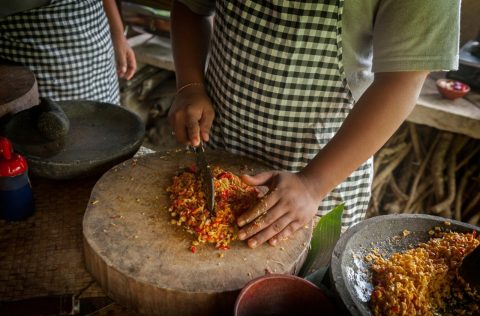
In Bali, food is ritual as much as it is sustenance. The island’s guiding philosophy of Tri Hita Karana – harmony among people, gods and nature – is expressed through offerings to deities and ancestors, feasts that mark temple festivals and ceremonies and recipes passed down through generations.
Learn about the local ingredients and flavours used in Balinese cuisine at an Authentic Balinese Cooking Class in Taro Village, a hamlet of emerald rice paddies, temples and traditional family compounds located about a 40-minute drive north of Ubud. Choose a morning class (7am to 1pm) to gather fresh produce from the colourful local market before rolling up your sleeves in an open-air kitchen set within an organic garden. Amid the pounding of pestles and the scent of lemongrass, the chefs will guide you through preparing bumbu Bali (spice paste), fragrant curries and satays, as well as spicy sambals, before gathering to share the dishes – and stories – of Balinese life.
Renew body, mind and spirit
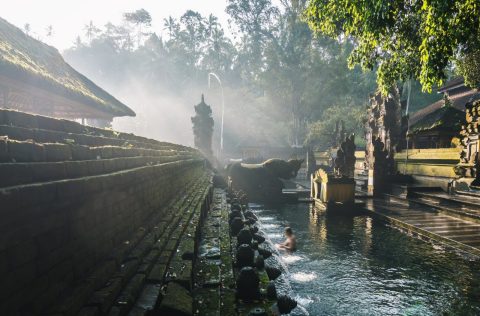
At Tirta Empul, a 1000-year-old Hindu temple 40-minutes from Ubud, worshippers clad in green queue to enter the two pools in the courtyard, which are fed by a holy spring. Pausing at each water spout, they splash their faces three times before fully immersing their heads in the stream. This is Melukat, an ancient Balinese purification ritual that aims to cleanse the soul and body of negative energy and restore inner peace. Visitors are welcome to participate and green sarongs and sashes are available to hire. Soak up the tranquility afterwards and explore the incense-filled corridors and fountain-dotted courtyards: the temple, which was built in honour of the god of water, Vishnu, is a remarkable example of Balinese architecture. For a more indulgent take on the tradition, Amandari’s spa offers its own Melukat ceremony as part of their signature Village Spa Journey, which includes black rice and cinnamon exfoliation, a volcanic clay body wrap and a therapeutic head massage.
Watch myths come alive at Ubud Palace
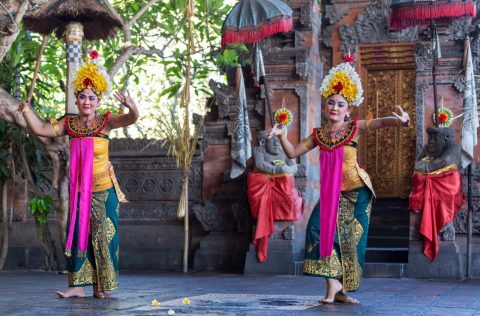
As the sun sets each evening, the Ubud Palace courtyard transforms into an open-air theatre. In the light of flickering oil lamps, dancers emerge in jewel-toned silks, dramatic make-up and golden headdresses to perform traditional Balinese dances, recognised by UNESCO as Intangible Cultural Heritage. The skilled artists depict Hindu epics and local folktales, transforming the ancient stories into movement. Each gesture, down to the flick of an eye or the precise position of a finger, is laden with meaning. The hypnotic percussion of the gamelan orchestra, the scent of incense and frangipani and the ornate silhouettes of the historical royal complex combine to make the Dance Performance a dramatic journey through Bali’s heritage.
